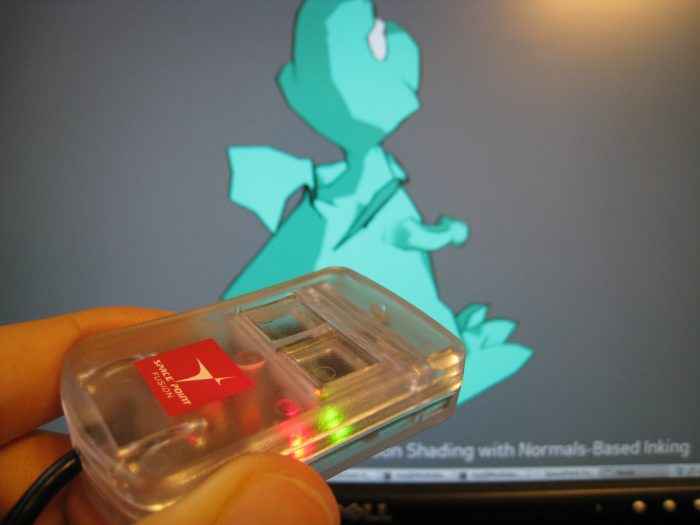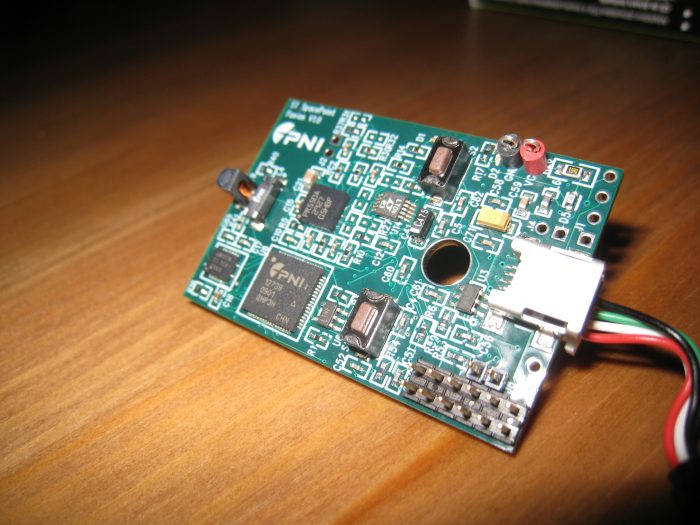My college roommate Donnie mentioned the PNI SpacePoint Fusion in comments of the HMC5843 post, and it seemed too good to be true. A 9 DOF controller (3 axes each of magnetometer, accelerometer, and gyro) with a Kalman filter to calculate a smooth quaternion that interfaces as a USB HID device, all for under $100. I’d be surprised if PNI is making any profit on it. I sound more like a shill than I’m normally comfortable with, but I’m truly impressed with this gadget. I have some plans for it involving a Microvision SHOWWX that I’m quite excited about; I’ll write more on that when it’s available in a couple of months.
PNI provides some Windows only sample apps that show off how weirdly stable and precise the SpacePoint Fusion is. Luckily, since it’s a normal USB HID device (redundant, I know), and PNI provides application notes, it’s easy to use on any platform. I wrote a Python module that uses libhid via python-hid to make it easy to prototype with in Linux. The usage is pretty simple, as shown below. Note that when plugging the device in, you need to keep it still for a few seconds while the gyros are calibrated. After that, the quaternion, accelerometer, and button data can be updated 62.5 times a second.
>>> import spacepoint >>> fusion = spacepoint.SpacePoint() >>> print repr(fusion.quat) (0.987518310546875, -0.04425048828125, -0.04119873046875, 0.145294189453125) >>> print repr(fusion.accel) (-0.054016113354999999, 0.018859863306999999, -0.89648437622400001) >>> print repr(fusion.buttons) (0, 0) >>> fusion.update() >>> print repr(fusion) accel: (-0.054016113354999999, 0.018859863306999999, -0.89648437622400001) quat: (0.97186279296875, -0.233428955078125, -0.030548095703125, 0.005401611328125) buttons: (0, 0) |
Update on February 7, 2010: I emailed PNI about a bug in the firmware, and got the following response:
Thank you for submitting the SpacePoint bug regarding libusb, Python, and Linux. You’re right! There is a bug in the SpacePoint FW that prevented opening interface 1 without opening interface 0 when using libusb under Linux. While your work around was effective in allowing the device to operate normally, one should be able to open interface 1 directly without the work around. We were able to use your Python source code to quickly diagnose and repair the bug. Please see the attached for the modified Python script. Please feel free to post this paragraph, the modified code, and all bragging rights on your blog (https://eclecti.cc/).
Units being shipped now have the fix. I modified the Python module to handle units both with and without the firmware fix and bumped the version to 0.2.
Download:
SpacePoint Python Module or
Standalone spacepoint.py
Setting udev rules to get the permissions right
In most cases, the module will just work properly. However, if you get the following error, you probably don’t have the right permissions to access the usb device.
>>> import spacepoint >>> fusion = spacepoint.SpacePoint() hid_force_open failed with return code 12. |
On most modern Linux distros, you can fix this by setting a udev rule for the device. In Ubuntu Karmic Koala, saving the following as /etc/udev/rules.d/45-spacepoint.rules , running sudo service udev restart , and then unplugging and replugging in the device should fix it:
# PNI SpacePoint Fusion SYSFS{idVendor}=="20ff", SYSFS{idProduct}=="0100", MODE="0664", GROUP="admin" |



Hey thanks a lot, this is very cool. If I want to access the raw sensor data instead of the calculated data, I must just change the 0x82 flag to 0x81 right?
That’ll make the SpacePoint give raw values, but you’ll need to change the update() method to parse them correctly. See:
http://www.pnicorp.com/files/SpacePoint%20Fusion%20User%20Manual%20r1.pdf
Yes everything works. In order to get the accelerometer values in g’s I had to multiply the raw values by 16 in addition to your arithmetic. But the gyros are still a mystery. The raw values are not described in the doc. Do you know their scale? Their center doesn’t seem to be 32768, but about 500 less. If I use their initial values as the center, they seem to give degrees/sec, but that is only a guess. I emailed pni but no reply yet.
Latest libhid-svn (rev. 364+) fixes the assert error if anyone was having that issue.
I also had to modify spacepoint.py to from “import hid” to “import libhid.hid as hid”
The Ubuntu package is slightly different than the source release.
Their site is a bit sparse on details. Is this the RM3000 Evaluation Board? Your link goes to a bunch of stuff in the product family, not a specific product. Thanks
I have no idea. Apparently they no longer sell the SpacePoint Fusion. The RM3000 appears to have exactly the same functionality, but over SPI instead of USB.
In the photo I see only X-sensor and Y-sensor, without Z-sensor, its really missing?
some mistake: on the photo Z and X-sensors, Y-sensor on the other side
now selling only PNI SpacePoint Scout (not Fusion). drift is very strong!